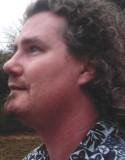Despite my dislike of Gertrude Stein's rejection of many forms of punctuation in her essay, "Poetry and Grammar," I think with poetry, she may be on to something. I used to punctuate most of my poems, but now I use line breaks as much as possible. Sometimes, I utilize punctuation. In fact, my reputation as a punctuation nut precedes me. For awhile, my classmates would ask if I had any comments about a peer's poem regarding punctuation. I can't overlook it when it's used incorrectly.
I live by Professor Mada Morgan's aphorism, "Whatever you choose, be consistent."
Sometimes, commas and semi-colons give poetry a clinical appearance. But, when used creatively, these marks provide as much power as words. A semi-colon, for instance, ties two not-necessarily related lines together; an old mare tows the heap of a car. That one little dot-and-tick brings meaning between a line of theory and a visual sentence. Written text practices magic.
04 June 2005
Subscribe to:
Post Comments (Atom)



2 comments:
I too try to live by the "be consistent rule." Although, I believe I got that one from a prof. at my old school and not Mada. Either way it works. But I don't always succeed.
I have never heard you described as a punctuation nut : )
Probably the main thing is using it creatively like you say. I find it interesting to learn where various people stand on this topic.
For my money, the master of punctuation is Mark Twain.
"Of all the kinds of sexual intercourse, this has least to recommend it. As an amusement it is too fleeting, as an occupation it is to wearing; as a public exhibition there is no money in it. It has, in our last day of progress and improvement, been degraded to brotherhood with flatulence--among the best bred these two arts are now indulged only in private--though by consent of the whole company, when only males are present, it is still permissible, in good society, to remove the embargo upon the fundamental sigh."
- Some Thoughts on the Science of Onanism speech, 1879
Post a Comment